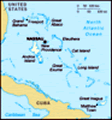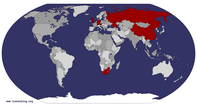Advertisement
Running aground is a great way to meet the locals.
My alarm beeped at 6:00. I snoozed for ten. Then, I woke everyone else up.
We pulled out after a prolonged breakfast, closer to 7:30 than the 7:00 we had planned. Doing so required a 180 degree maneuver, all the while clearing the other boats in the dock. We had discussed the operation the night before and , given the low amount of wind on this morning, decided that we should swing the stern around with the bow still at the dock, and then throttle away. Sounds easy.
Somehow in doing so, the boat began drifting towards other expensive yachts and in order to compensate, the captain motored ahead... into the dock. I was standing on the bow pushing with all my might against the dock with a pole. The vessel slowly nudged the planks of the dock and fell away into the desired position. It was ugly, but we were underway.
We enjoyed the quiet of the morning, floating the way out of the harbour. Red, orange, hyacinth, pink, lapis lazuli and blue stretched across the sky like a didactic spectrum, breaching the distance between
day and night. It felt like a smooth sail awaited us.
The waters outside the embrace of the harbour were expectedly alive, hardly as ominous as the ones upon our original departure. We noticed a small motorboat with two locals out for a fishing expedition. They fell behind for a moment, but then caught up with us alongside a few minutes later.
“What are those guys doing!” yelled the captain, annoyed at their persistant presence.
We continued out away from West End, scoping out the path we would need to thread. According to the map we had studied and the GPS readings given on our satellite autopilot, we would need to bear just to the left of a metal pile sticking up out of a small rocky outcropping. Through a thin channel 100 feet wide and 500 feet long we could pass into the easily managable path stretching around the northern side of Grand Bahama to the Abacos.
Reaching the pile the captain spun the wheel to the right and set a course just several dozen feet to the left of the metal rod sticking out of the water. Around it, the waves churned like a
whirlpool with no sense of current or direction, just a stagnant turbulence. The captain lowered the throttle into the weakest acceleration. Franzi and Mau moved to the bow in order to monitor changes in color and clarity of the ground. I stayed in the cockpit to assist the captain with map navigation.
“It’s looking pretty shallow!” Franzi yelled back to us.
This must be right, we thought. I looked at the GPS map, indicating our small black circle squeezing through the two banks on either side.
We’ll make it.
The small waves made their presence known, beginning to lift the boat slightly above the waterline. I looked over the side and watched the algaed ground pass refracted beneath the waves.
BAM!
A wave dropped the hull onto a rock.
Dragggggggggg.
“Fuck!” the captain yelled.
“Put it in reverse!” I growled.
“No, we gonna keep going,” he assuredly bellowed.
BAM!
“What? You can’t go backwards?” I retorted
GRRRRRRR.
“It’s ok, we can make it!”
BAM!
The boat began to pivot to the right, facing the rocky nemesis we had tried to sidestep.
“Come on dammit!” the captain shouted as he spun the wheel to the right, trying to follow the movement of the boat back into the deeper waters behind us.
BAM!
The boat began to tilt dangerously to the starboard*. I grabbed the nearest wire support for balance and made may way around to the bow, grabbing an extension pole on the way. Pulling out and twisting the pole to its 15 feet of length, I drove the probe onto a rock beneath the waters like Poseidon with his trident, trying to swing the bow further towards safer waters.
Futile.
BAM!
I looked up and noticed the two fishermen approaching on their motorboat. They had immediately recognized our quandary and gestured to throw us a rope. I gathered a bowline and attatched one end to the clete on the bow and tossed the other end towards the one in a wetsuit standing at the bow of the small craft. I caught sight of a pile of freshly caught spiny lobsters at his feet.
That lean black fellow wearing a cap and a goatee caught the line and attached it to the stern of the boat, right next to the grumbling engine. His older companion in a white T-shirt and MLB cap shoved the boat into full throttle, swinging the mighty yacht around fully towards the direction from which we had come.
BAM!
In the meantime, the other crew were scrambling about bracing themselves against the tilting and jostling of the helpless yacht. Treva disappeared into the belly of the yacht to radio for help. Franzi and I remained on deck assisting the operation in any way possible. In all this, Mau was steadily taking pictures, perhaps because it might be the last, or because it might be useful for insurance, or even because it might be memorable. The captain remained at the helm, determined to make it through.
Grrrrrrrrrrrr. I felt the hull drag into the rock. We were stuck.
The two locals neared the boat next to us. The lean one yelled out, “Give us the halyard!”
Right, the halyard is the line running up the mast to the top. What could he want that for? Our captain abandoned the helm and grabbed onto the mast as the boat fell into a 30 degree tilt. He nimbly untied the bundle of rope, separated a few loops of it and launched it towards the open hands of the lean one, who then stepped over the lobsters to the stern of the boat and attached the line, lifting up to the top of the mast.
“GET ON THE PORT* SIDE!” he yelled, as his companion shoved the throttle into gear.
We crossed over the deck to the high side of the boat, grabbing on to whatever lines and railings we could. The line connected to the mast above tightened sending the boat further into an almost 45 degree tilt.
The rushing of water, the crashing of waves, but no contact. The growl of an engine, the whirlpool of white and steady movement away from the pile. We remained suspended at the edge of the yacht slowly returning to the waters we had trodden before.
Of course! I realized then that tilting the boat from the top of the mast lifts the hull from the ground in spite of an obscene angle. In a matter of seconds, we found ourselves upright and headed towards deeper waters.
“The roddah sep’rated nto two,” the lean one announced as he took off his diver’s mask.
“Where can we get it fixed?” the captain called.
“You gonna have to go to Freeport”
We looked at one another. Treva neared the edge and asked, “How much can we pay you for you to take us there?”
The older one smiled in disbelief as he revved the boat into reverse. “However much you want.”
“Two hundred?” Treva asked, extending the bills over the railing.
“As you like,” he answered, taking the bills.
We tied their boat to the rear of Nautilus and the two joined us in the cockpit for the trip to Freeport. After organizing the lines and stowing them, I cast the fishing line from the rear of the boat and joined our companions in the cockpit.
“Benjamin,” the lean one said.
“I’m Advardo,” the older one followed.
“How many times you’ve helped people out there?” I asked.
“Many. It’s a tricky spot.” Advardo said. He was stretched out on the bench underneath his baseball cap, as if he still hadn’t a care in the world. He spoke in normalized English and exuded the insoucience that a seasoned father might have. “You were too close to the pile!”
He turned around and pointed to the left, some several hundred feet from the metal rod to a sliver of blue amidst the familiar dark turbulence. “That’s the channel.”
“Well what happened to the other pile, the one we were supposed to line up with that one there?” I said.
“Wilma chooky daway,” Benjamin said.
I paused, waiting for my brain to process his patois.
Oh, the hurricane three months ago.
“Man, that one destroy everything!” the older one added.
Benjamin remained silent sitting on the edge of the cockpit facing the water as the captain, Advardo and I conversed at ease. The dialogue meandered through the usual topics like drunk driving (“Man, the cops here are gonna stop you if you swervin, but not if you drunk!”), prisons (“Man, only Cuba has worse prisons! Here you sleep on concrete. In the US, you got AC!”), the recent crash of a Clyde’s plane in Miami harbour (“Man, a whole family from Bimini died, just to do Christmas shopping!”), gas prices, crazy driving and the parties to be had at various parts of the islands. When the subject of the water temperature on the north side of Grand Bahama came up, Advardo replied, “Man, it cold like you in a refrigerator!” And when Mau asked about the poison in a barracuda, he replied, “Man, it make you sick like you in a car accident!”
Arild put on some Bahamian music he had picked up in Hope Town which the guys recognized. “Oh, this Gully Rooster?” Advardo smiled as he nodded his head to the beat and began to sing along: “If lovin’ you so wrong I don’t wanna do right!”
Arild asked how far it was to Freeport. “Oh,” Advardo paused to reflect, “tell the Bradford marina you arrive about 12 o’clock.”
Arild punched in the new coordinates into his GPS and waited for the calculation. “Well done! 12:04!”
Mau offered to make a sandwich for the guests and crew. Thirty minutes later, with no sandwich in sight, I informed our Bahamian passengers, “There’s no fast food in Italy. If she had a bread maker, she’d even make the bread from scratch.”
She appeared a few minutes later with an immaculate concoction of vegetables, deli meat, and spices. The Bahamians stared at the contents, shrugged it off and devoured the sandwiches.
Treva and Franzi sat at the bow obviously discussing their reactions to the past few days. The captain continued to steer, but at times wore a withdrawn countenance, even once remarking in dismay, "Man, I ran aground." Mau was swept up in culinary preparations, as if rechanneling her anxiety about the fiasco. As I ate in silence, I let my thoughts simmer. The trip had certainly taken a wild turn. I began to wonder what lay in store for this whole trip. It seemed that twice now, our intended move was thwarted by some act of nature, i.e. the change in winds and shallow ground disguised by the wrath of a hurricane. Perhaps we were trying too hard to control our path.
Whatever lay ahead of us, we would need several days to repair, recuperate and regroup.
(* Yachting terms: port- left, starboard- right, helm- steering wheel, stern- rear of the boat, bow- front point of the boat)
Advertisement
Tot: 0.196s; Tpl: 0.013s; cc: 10; qc: 63; dbt: 0.1417s; 1; m:domysql w:travelblog (10.17.0.13); sld: 1;
; mem: 1.2mb









